Musicarta Twelve-bar Piano Styles
Chromatic Thirds
Chromatic thirds feature heavily in blues and twelve-bar music – and have passed into jazz and pop music as well. As part of your melodic and harmonic ‘vocabulary’, they’re well worth mastering, whatever genre you play in.
This module presents an uncompromising ‘full-on assault’ on the twelve-bar chromatic thirds. Proceed with caution and take it in small bites to avoid feeling overwhelmed.
The notes of the thirds
Chromatic thirds in twelve-bar music generally move both up and down:
- between the root-and-third and the third-and-fifth, and
- between the third-and-fifth and fifth-and-(flattened) seventh.
Here are those notes in C (C7).

The essential feature to grasp in order to make these thirds easily available as an element in your playing is the single whole-tone step in the entire series – between the root of the chord and the second scale degree (marked).
All the other steps in this basic series of thirds are semitones.
The scale used in the chromatic twelve-bar thirds is therefore this:

Namely, all semitones from the root up to the flattened seventh, except for the first root-to-major-second step. (This makes the thirds easier, not more difficult, to remember.)
Fingering the thirds
There are many ways to finger these runs of thirds. Try out the sample fingerings on the next page.
Many of these fingerings stray far from the classical model. Some involve sliding off the black keys onto the white keys. Improvising musicians don’t have the luxury of working everything out in advance, and often have to use unorthodox fingering.
Never getting to grips with fingering in ‘nitty gritty’ cases like this can waste years of your time. Your performance is never reliable and you do not enjoy the experience.
Spend some time just fingering the chromatic thirds in the remainder of this module, marking up your print-out in pencil. Decide on a fingering and stick to it – you can vary it later when you feel more in charge.
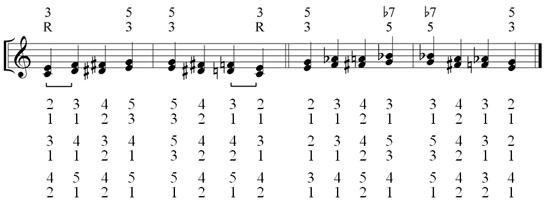
(The ‘up’ suggestions in the fingering don’t necessarily have to go with the ‘down’ suggestions which follow.)
Note that when you transpose into other keys, other black keys come into the picture, and these fingerings will no longer necessarily work.
Studies in thirds
Here is a study purely for memorising the thirds.
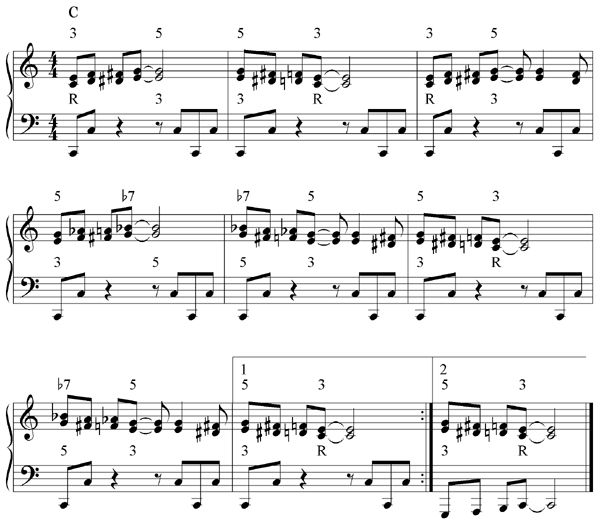
Simplify the off-the-beat bass line to simple crotchets (quarter notes) while you learn the notes and build your performance (as demonstrated in the first chorus of the performance files).
Transposing the thirds
Because blues and twelve-bar music is essentially ‘music in three keys’, you need to know this pattern in all the I, IV and V (tonic, subdominant and dominant) chords of the key – C, F and G in our present key of C.
Transpose the first study (above) into F and G – use MidiPiano to ‘check your answers’ – or use this ready-made three-chord variation to drill the thirds.
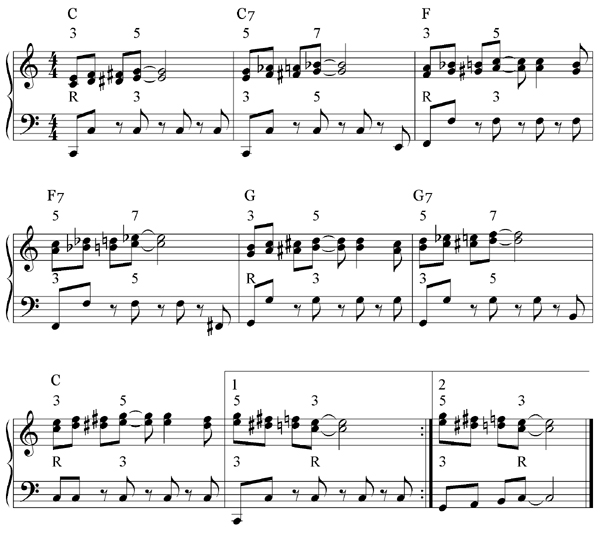
Further transposing
In order to play with other people, you are going to need to know the thirds in sharp keys (for guitarists) and flat keys (for horns).
You can easily transpose the two Thirds studies in this module using the Key function in MidiPiano. Click up twice to put yourself in D, and down twice to get into B flat. Slow the performance down and watch it through a number of times, until you can identify the root, third, fifth and flattened seventh of the new chords. Then try to play just the right hand thirds, without any rhythm, and start working on some reasonable fingering.
Keep using the ‘landmark’ R (root), 3rd, 5th and 7th mark-up in the MS to help make sense of all the semitones. There’s no substitute for this ‘grunt work’!
Chromatic thirds - repertoire
In your Twelve-bar Styles workbook you will find the music for the Frantic Thirds piano solo and the Slippery Customers piano duet/solo.
Here is the Frantic Thirds video with the audio-only version and MIDI file reference below.
As always, you will feel free to simplify the bass as you learn
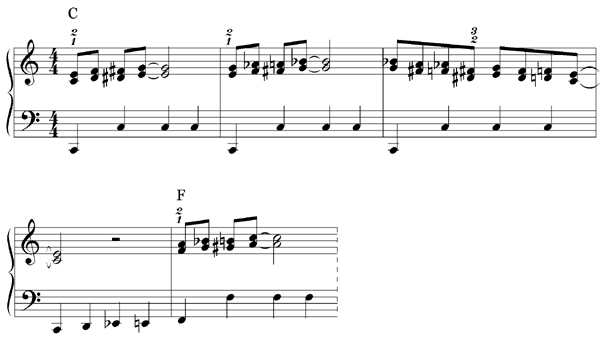
|
OUT NOW! |
THE MUSICARTA BEAT & RHYTHM WORKBOOK At last! An effective approach to keyboard rhythm & syncopation skills. Learn more! |
ONLY $24.95! |
The MusicartaA methodical approach to keyboard syncopation for
|
PUBLICATIONS
exciting keyboard
creativity courses
CHORDS 101
WORKBOOK

~HANON~
video course

Musicarta
Patreon
PENTATONICS
WORKBOOK
video course

Creative Keyboard
video course

BEAT AND RHYTHM
WORKBOOK
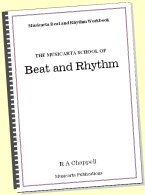
- Volume 1 -

12-BAR PIANO
STYLES WORKBOOK
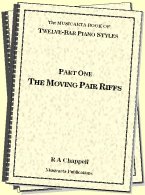
MUSICARTA MODES
WORKBOOK
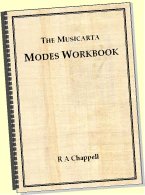
PIANO STYLE
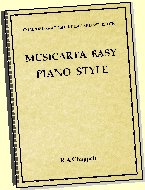
CANON PROJECT
video course
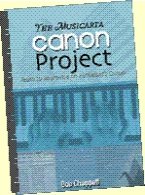
VARIATIONS
video course
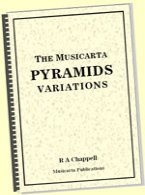
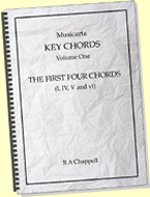
- Piano Solo -
video course

- Piano Solo -


YouTube playlists





 THE LOGO
THE LOGO
